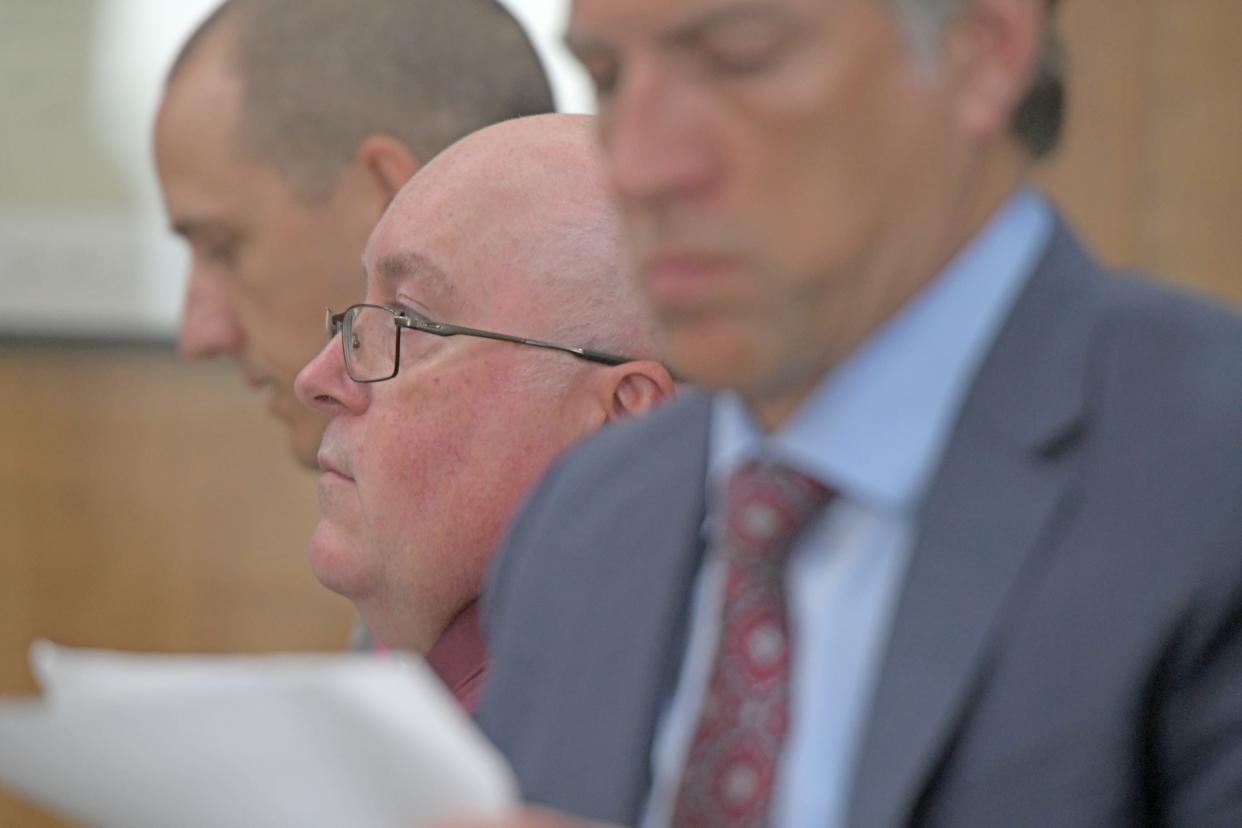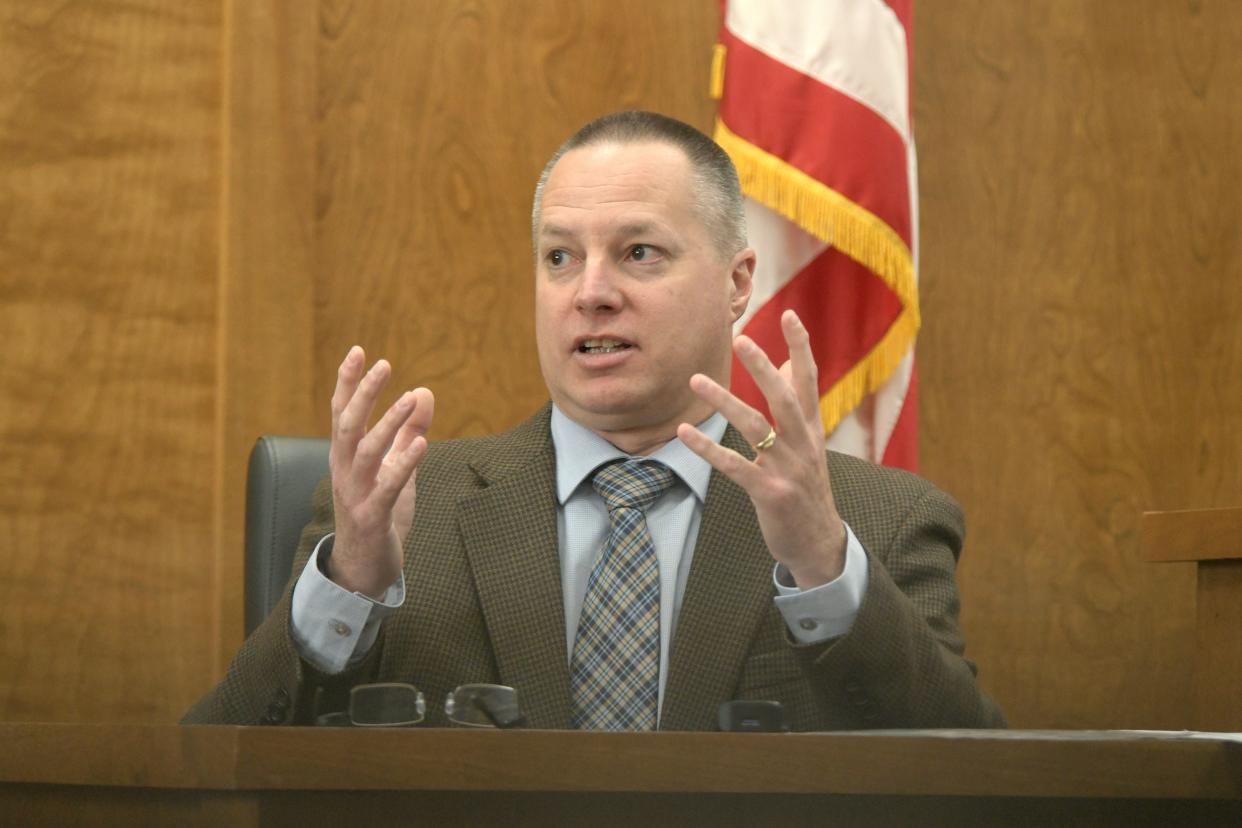Attorneys deliver closing arguments in Mark Cooper retrial over inmate death
Deliberations were to start Wednesday morning. For a possible verdict, check www.mansfieldnewsjournal.com.
Attorneys on opposing sides of the Mark Cooper retrial didn't agree on much in their closing arguments.
They did agree, however, that the case would come down to cause of death and reasonable use of force.
Jurors sat through a grueling four hours of closing arguments Tuesday afternoon in Richland County Common Pleas Court. One older juror let out an audible sigh during the rebuttal argument toward the end of the session.
Cooper, 57, is charged with two counts of involuntary manslaughter, one a first-degree felony, the other a third-degree felony; and reckless homicide, a third-degree felony.

His charges are in connection with the death of Alexander Rios, 28, after the inmate rushed out of his holding cell, past several corrections officers on Sept. 19, 2019.
Denise Salerno, who is with the Cuyahoga County Prosecutor's Office, is teaming with Drew Wood of the Ohio Attorney General's Office as special prosecutors for the state.
In her closing, Salerno attacked the defense theory that Rios was under the influence of methamphetamines during his struggle with corrections officers, leading to his heart stopping.
In the jail video, several of the corrections officers can be seen holding Rios down, stepping and kneeling on his back as they try to handcuff him.
State discounts defense theory that Rios was under influence of meth
According to previous testimony, Rios was a presumptive positive for amphetamines, but no confirmation test was done.
"Nobody saw or knew that Mr. Rios had taken methamphetamines," Salerno told the jury. "How far are we going? Inference upon inference upon inference."
During the autopsy, a ripped bag of plastic was recovered from Rios' stomach.
"What testimony did you hear that this contained a bag of methamphetamines?" Salerno said.
She urged jurors to watch the jail video, parts of which were played dozens of times in the first six days of the trial. Salerno said to note how Rios was doing when Cooper became involved and stood on the inmate.
"He goes from active to wheezing," she said. "Mr. Rios is having difficulty breathing. This is escalating.
"You can hear that last gasp. You stop seeing any movement from Mr. Rios, but you still see Mr. Cooper staying on him."
Former Lt. Jamaal O'Dell, who was the supervisor during the incident, said corrections officers are trained not to put their feet on inmates.
Salerno said the state did not have to prove that Cooper intended to kill Rios.
She played the entire video straight through before referring to a timeline of events. Cooper came from another part of the jail to join the altercation at the 1-minute 25-second mark.
Cooper can be seen placing one of his feet on Rios at the 1:53 mark.
"Nobody else is doing this," Salerno said of the other corrections officers involved.
Cooper can be seen standing on Rios with both feet
At the 2:55 mark, Cooper is seen standing on Rios with both feet. During the first trial, his weight at the time was listed at 250 pounds.
"Other officers are subduing him (Rios). Mr. Cooper could have simply stepped off," Salerno said. "... He did not have to engage."
Defense attorney James Mayer III delivered a 2-hour closing argument. He started by talking about cause of death and reasonable force.
"They are separate, but they are so interrelated," Mayer said.
Mayer focused on the state's focus on the 7 seconds Cooper stood on Rios with both feet. He said that would not kill a person.
He also talked about the official cause of death in 2019, excited delirium. It is characterized by agitation, aggression, acute distress and sudden death, often in the pre-hospital care setting and often involving drug use.

The term is no longer recognized by many organizations, including the National Association of Medical Examiners.
"Delirium is very real," Mayer countered. "The controversy is on how it kills somebody in a delirious state."
He pointed out that Dr. Lee Lehman, who oversaw the autopsy at the Montgomery County Coroner's Office, believes excited delirium was the cause of death.
Mayer said the state claims that his client crushed Rios to death.
Defense attorney points out there were no injuries to Rios
"What would you expect (if that were the case)? It would start with an injury of some sort, maybe some damage or trauma to the bone structure," Mayer said. "There were only a couple of scrapes and abrasions."
Mayer devoted part of his closing argument to attacking Dr. Roger Mitchell, the state's expert witness. He was paid $500 an hour for his services, plus $3,500 for his testimony.
Mitchell has written a book on instances of people dying in custody.
"This man is a hired gun. He is a champion for social change, good for him," Mayer said. "This man has bias, and he has an agenda, and it informs every opinion he makes."
Mitchell said Rios died from compression asphyxia.
"Dr. Mitchell ignores the weight of every other corrections officer (involved in the wrestling match)," Mayer said. "There is not point and time that you can see the green of his (Rios') smock."
Mayer agreed with Mitchell on at least one point, that methamphetamine is dangerous to the heart.
"Nobody is suggesting that because of Rios' actions, that he deserved the consequence of death," Mayer said.
In the video, Rios is seen standing on a half-wall in his holding cell, yelling at corrections officers.
"That looks like methamphetamine intoxication," Mayer said, noting signs include confused behavior, combatant and non-compliant. "The delirious state is still a thing. What's going on in his body that brings his heart to a stop?
"... What Rios is presenting is as a ticking time bomb of his own creation. It's going to go off, and when it does, his heart's going to stop."
Mayer says use of force was justified
As far as use of force, Mayer said it was justified in this case. He noted that O'Dell called the incident the most difficult restraint of his 20-year career.
"Let common sense be your guide," he told the jury.
Because the state has the burden of proof, Wood was able to give a rebuttal argument.
Wood discounted the idea that Cooper caused Rios' death in the 7 seconds he stood on him with both feet.
"Those are Mr. Mayer's words, not ours," Wood said. "That pressure started much earlier.
"Something killed Alexander Rios. He was alive when he was running around. He was dead after the restraint. Whatever drugs were in his system didn't kill him."
Wood said jurors had to decide the "case that exists, not the one that Mr. Mayer imagines."
He also attacked excited delirium, noting the term does not say how death is caused.
In closing, Wood praised Mitchell as an expert witness. He said the National Association of Medical Examiners commissioned his work on the topic of death in custody.
"The evidence in this case is Dr. Mitchell follows the truth," Wood said. "Dr. Lehman made a mistake."
mcaudill@gannett.com
419-521-7219
X: @MarkCau32059251
This article originally appeared on Mansfield News Journal: Closing arguments in ex-Ohio corrections officer's manslaughter case
